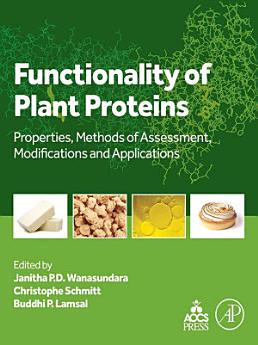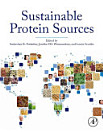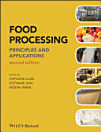Functionality of Plant Proteins: Properties, Methods of Assessment, Modifications and Applications
About this ebook
About the author
Dr. Janitha Wanasundara is a Senior Research Scientist at the Saskatoon Research and Development Centre of Agriculture and Agri-Food Canada (AAFC) while affiliating as an Adjunct Professor at the University of Saskatchewan, Canada. She holds a doctorate in Food Science and has over 25 years of experience in the food chemistry, protein chemistry and food technology areas as a researcher and a university level educator. Dr. Wanasundara’s research efforts are to understand seed proteins for their optimum use in supporting environmentally sustainable healthy foods and renewable bioproducts. Dr. Wanasundara has contributed to more than 85 peer reviewed publications and book chapters in the field of food science and holds a patent on protein processing of Brassicaceae oilseeds. She has been involved in organizing various scientific conferences and made presentations and webinars on science and technology relevant for the developing plant protein industry. Dr. Wanasundara is a Certified Food Scientist.
Dr. Christophe Schmitt is a Protein Expert Scientist at Nestlé Research Lausanne, Switzerland. He holds a doctorate in Biotechnology and Food Processing and has contributed over 150 peer reviewed publications, book chapters and presentations in the area of food protein structure and functionality. He is co-inventor of more than 60 patent applications in the field of protein functionality applied to food and serves the advisory board of several plant-based foods and proteins projects and global initiatives.
Dr. Buddhi Lamsal is a Professor at the Food Science and Human Nutrition Department, Iowa State University. He holds a Doctorate in Agricultural Engineering with food processing emphasis from University of Wisconsin- Madison, WI. He has contributed over 90 peer reviewed journal publications, several book chapters and presentations in the area of plant protein extraction processes, their impact on protein quality and broader range of ingredient functionality, and protein modification. He is an active member of scientific professional societies, AOCS and IFT.





